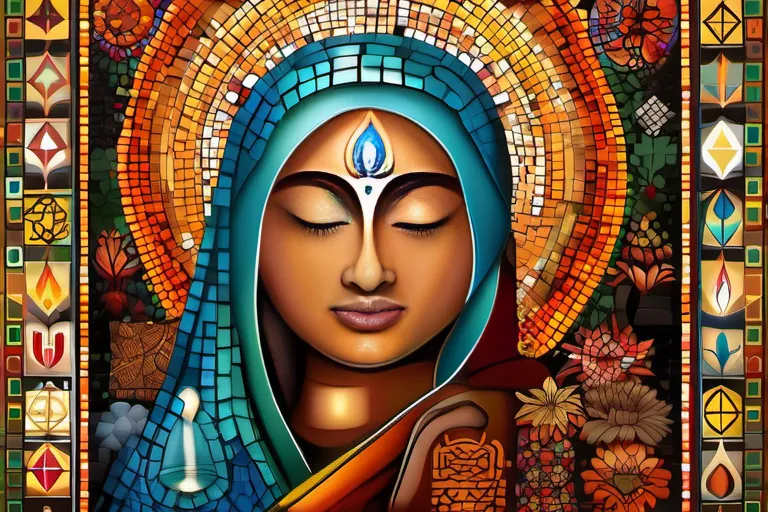Explore the intricacies of ethnic religion, its definition, and its impact on culture.
Ethnic religion is a fascinating topic that intertwines cultural identity, tradition, and spirituality. In this article, we delve into the complexities of ethnic religion, providing a comprehensive understanding of its definition, role in society, and its influence on various cultures worldwide.
The Concept of Ethnic Religion
What exactly is ethnic religion? Is it simply a local version of a global faith, or does it have its own unique characteristics? Let’s delve into this intriguing question and explore how ethnic religions differ from mainstream religious systems.
The term ‘ethnic religion’ can be seen as a metaphor for the deeply rooted beliefs that are often tied to a specific community’s history and traditions. Imagine these religions as the veins of a tree, branching out from the core values that define a culture, each vein representing a unique belief or practice passed down through generations.
Unlike mainstream religions like Christianity or Islam, which have spread far beyond their original cultural contexts, ethnic religions are often closely tied to the land and people they originated with. They evolve naturally within these communities, adapting to changes but maintaining a strong connection to the past. This makes them more than just belief systems; they are integral parts of the social fabric.
One might wonder why such religious practices persist in an age where global religions dominate media and public discourse. The answer lies in their deep-rootedness and relevance to daily life. Ethnic religions often provide a sense of identity, purpose, and continuity that modern, organized religions may struggle to offer as they expand beyond their native grounds.
Moreover, ethnic religions can be seen as a form of cultural resistance against homogenization, acting as a shield for communities to maintain their distinctiveness in the face of globalization. They serve as living testaments to the resilience and adaptability of human culture, much like how a river carves its path through rock, carving out unique landscapes over time.
Ethnic Religion and Cultural Identity
Understanding ethnic religion and its impact on cultural identity is like peeling back layers of a colorful onion. Each layer reveals more about the vibrant tapestry that makes up human culture. How does ethnic religion shape our sense of belonging? Can it be considered the heartbeat of a community, pulsating with unique traditions and beliefs?
Consider cultural identity as a mosaic, where each piece is an individual’s heritage, experiences, and beliefs. Ethnic religions often act as the adhesive that binds these pieces together, creating a cohesive picture. For many people, ethnic religion isn’t just about worship; it’s about maintaining connections to their ancestors and cultural roots.
The role of ethnic religion in fostering a sense of belonging is profound. Imagine community gatherings during harvest festivals or rites of passage. These rituals not only celebrate life cycles but also reinforce the shared values and beliefs that hold a group together. By participating in these traditions, individuals reaffirm their identity and commitment to their community’s legacy.
Moreover, ethnic religions often provide a framework for understanding the world around us. They offer explanations for natural phenomena, moral codes, and social norms. This holistic approach to life can be incredibly comforting during times of uncertainty or change. It’s like having a map that guides one through the complexities of existence, providing a sense of security in an ever-changing landscape.
So, how does ethnic religion impact cultural identity? Is it merely a historical remnant, or does it continue to play a vital role in shaping our present and future? These questions invite us to explore the dynamic relationship between religion and culture, reminding us that while traditions may evolve, their essence often remains unbroken.
The Influence of Ethnic Religion on Society
How does ethnic religion shape the fabric of society, weaving through its political threads and economic looms? Ethnic religions, deeply rooted in local traditions and practices, often serve as a guiding light for communities, influencing their social structures in profound ways. Have you ever wondered how these ancient beliefs impact modern societies?
Consider the role of ethnic religion in politics. Often, political movements and ideologies can be intertwined with religious beliefs. For instance, in many ethnic religions, leaders are seen as protectors or guardians of cultural heritage. This can lead to a blend where political leadership is also spiritual, fostering a sense of unity and purpose among followers. Can you imagine the impact when such a leader emerges during times of social upheaval?
Economic structures also feel the influence of ethnic religion. Traditional festivals and rituals often boost local economies through tourism and trade. For example, during harvest seasons or religious celebrations, markets come alive with traditional crafts and goods. This not only supports local businesses but also reinforces cultural pride. How many times have you witnessed the economic benefits that stem from these deep-rooted traditions?
Moreover, social structures in communities practicing ethnic religions are often tightly woven around shared beliefs and practices. Marriages, for instance, may be arranged to maintain religious or cultural continuity. Educational institutions might also emphasize traditional teachings over modern schooling. These customs help preserve a community’s identity but can sometimes lead to tensions with broader societal norms.
It’s fascinating to see how ethnic religions not only hold communities together but also influence the very way they navigate and shape their societies. From the political stage to economic markets, these religious practices play a crucial role in defining who we are as individuals and as communities. Do you think there’s more to explore about the nuanced impact of ethnic religion on society?
Ethnic Religion in Different Cultures
Imagine stepping into a bustling village market where the air is thick with the scent of incense and the sounds of chanting blend with the everyday hum of life. How do these vibrant religious practices differ from one culture to another? Let’s delve deeper into the unique manifestations of ethnic religion across various regions.
Take, for instance, the Shinto traditions in Japan, where natural landscapes are revered as sacred spaces and kami (spirits or gods) inhabit these places. The intricate rituals performed at shrines not only honor these spirits but also maintain a harmonious relationship between humans and nature. How does this concept of coexistence with the spiritual world shape Japanese society?
In contrast, the Ashanti tribe in Ghana practices a religion deeply rooted in their history and daily life. Their deities are often represented by small figures or symbols, and rituals are closely tied to both agricultural cycles and personal growth. How do these cultural practices influence Ashanti social structures and community cohesion?
Moving across continents, we find the Santería religion in Cuba, which blends African spiritual beliefs with Catholicism. This syncretic approach not only reflects the history of colonialism but also the resilience of the human spirit to adapt and thrive. What lessons can be drawn from this blend of traditions in other multicultural societies?
Each ethnic religion is like a colorful mosaic piece, unique yet essential to its cultural landscape. By exploring these diverse practices, we not only uncover the rich tapestry of human spirituality but also gain insights into how these beliefs shape and are shaped by society.
As we continue our journey through this comprehensive guide, remember that every culture has a story to tell through its ethnic religion. These stories are not just about gods and goddesses; they’re tales of humanity, resilience, and the profound connection between people and their environment.
The Evolution of Ethnic Religion
The journey of ethnic religion is like tracing the winding river of time, carving deep into the heart of cultures and societies. How did these ancient beliefs evolve over centuries? What adaptations have they undergone to survive through tumultuous times?
Imagine a small village where people have always worshipped the spirits of nature in their rituals. Over generations, as the world around them changed, so too did their practices. Perhaps they adopted new deities from traders passing by or integrated elements of a neighboring religion to strengthen their community bonds.
- Evolution: These changes were not abrupt but gradual, like how a flower slowly unfurls its petals in spring. The village’s beliefs adapted to the shifting sands of history, yet still held onto their core essence.
The resilience of ethnic religions is another fascinating aspect. Despite the dominance of more organized and powerful world religions, these indigenous faiths have persisted. Think of them as tenacious vines, wrapping themselves around the rocky outcrops of human civilization, refusing to be uprooted by changing tides.
In some regions, ethnic religions merged with other traditions, creating syncretic practices that enriched both systems. In others, they maintained their purity, passing down myths and rituals through generations almost unchanged. This dual path of adaptation and preservation has made ethnic religions a unique tapestry in the rich mosaic of human spirituality.
Their journey from ancient origins to modern times continues, with each culture adapting to its environment while holding onto the threads that bind them to their roots. How will these religions evolve in the future? Will they continue to thrive, or will they fade away like a forgotten whisper?
Contemporary Issues in Ethnic Religion
As we delve into the contemporary issues facing ethnic religions, it’s like navigating through a dense forest where every step reveals new challenges and opportunities. How do these ancient traditions fare in today’s globalized world? Are they thriving or struggling to stay relevant?
One of the most pressing issues is globalization. Imagine an old tree rooted deep in a small village; suddenly, it’s exposed to strong winds from all directions. Globalization can be seen as those winds, bringing new ideas and cultures that sometimes overshadow local traditions. For many ethnic religions, this can feel like their identity is being eroded by the dominant global trends of consumerism and secularism.
Secularization poses another significant challenge. In many parts of the world, societies are becoming increasingly secular, meaning people are less inclined to see religion as a central part of their lives. It’s akin to watching a vibrant community of believers slowly diminish in numbers because they no longer feel the need to participate. How do ethnic religions maintain their spiritual significance when faced with such a shift?
Religious pluralism, on the other hand, presents both threats and opportunities. The world is becoming more diverse, and multiple religious beliefs coexist side by side. This can be seen as a melting pot where different flavors mix to create something entirely new. But for ethnic religions, this mix can sometimes lead to assimilation or even disappearance if they are not recognized in the pluralistic landscape.
Moreover, how do these traditions adapt without losing their essence? It’s like trying to keep a delicate flower alive under harsh conditions. They must find ways to remain true to their roots while embracing modernity and new contexts. This balancing act can be incredibly challenging but also rich with potential for growth and innovation.
As we look at these contemporary issues, it becomes clear that ethnic religions are not just surviving; they are evolving. Each challenge faced is an opportunity to reshape and redefine what it means to follow a traditional path in today’s complex world.
Conclusion
 By the end of this article, you will have gained valuable insights into the intricacies of ethnic religion. You’ll understand how it shapes cultural identity, fosters community bonds, and contributes to the rich tapestry of human spirituality.
By the end of this article, you will have gained valuable insights into the intricacies of ethnic religion. You’ll understand how it shapes cultural identity, fosters community bonds, and contributes to the rich tapestry of human spirituality.











